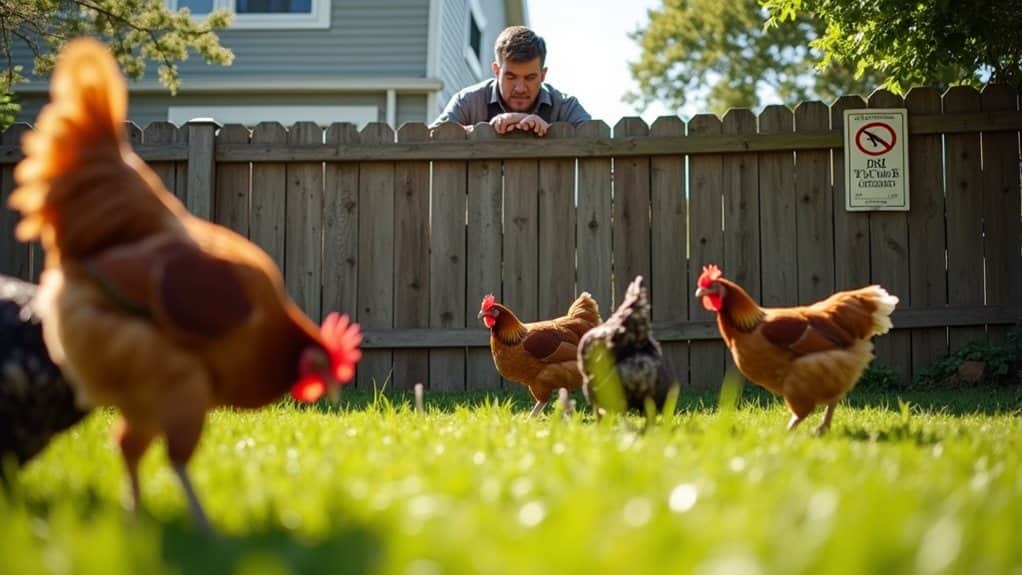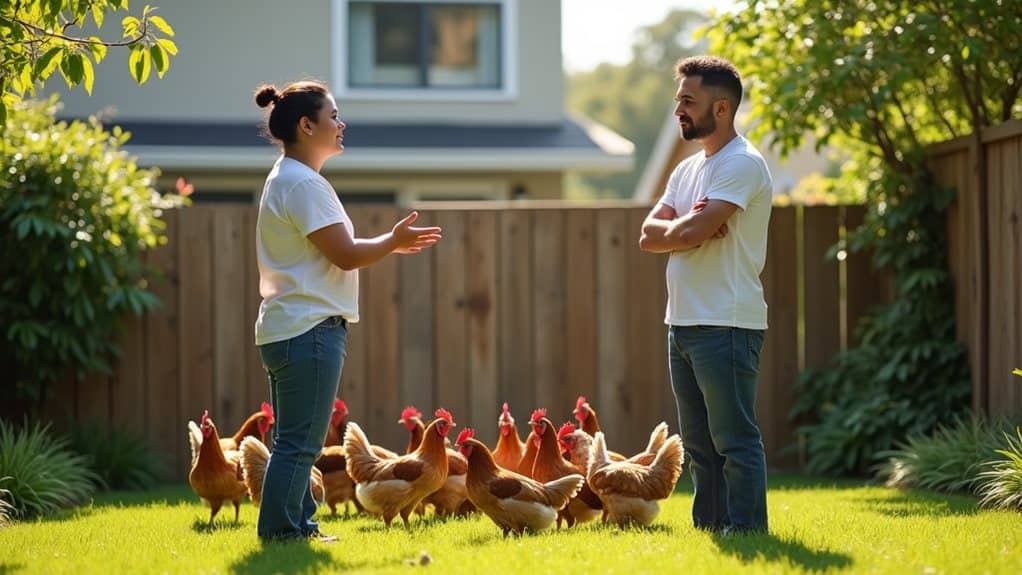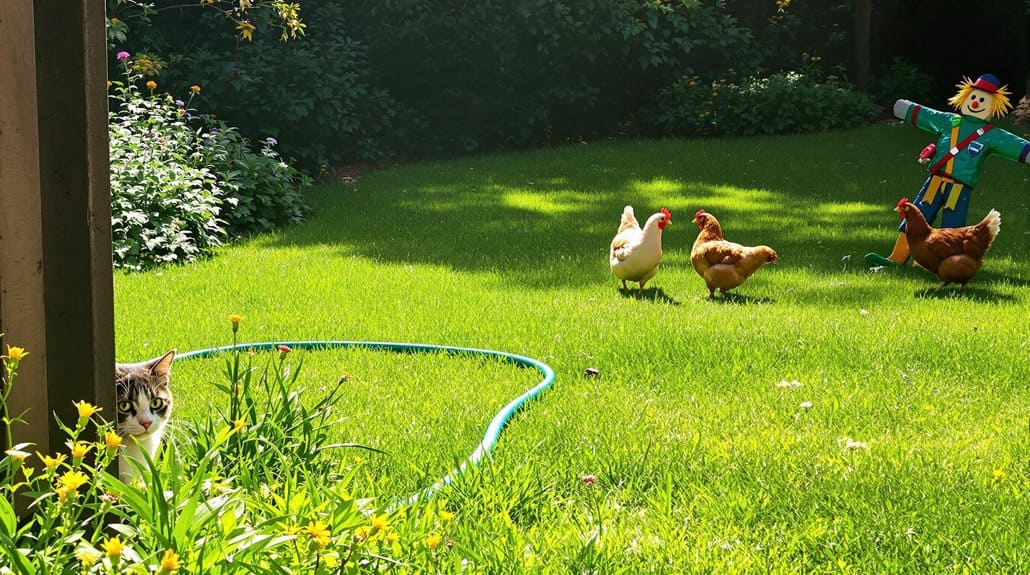How to Get Rid of Neighbor’s Chickens: Simple Solutions
If you're facing the challenge of a neighbor's chickens disrupting your peace, it's important to approach the situation thoughtfully. First, you'll want to familiarize yourself with local regulations regarding poultry ownership and any noise or odor complaints. Engaging your neighbor in a respectful conversation could open the door to collaborative solutions that benefit both of you. But what if that doesn't resolve the issue? Exploring various strategies might just lead you to the right approach, so let's consider some effective ways to tackle this problem.
TLDR
- Initiate a friendly conversation with your neighbor to express your concerns about their chickens and discuss potential solutions collaboratively.
- Document disturbances caused by the chickens, including noise and odor, to support your case if you need to take further action.
- Check local regulations regarding chicken ownership and ensure your neighbor is compliant with zoning laws and HOA rules.
- Suggest practical improvements to the chicken coop, such as insulation and proper placement away from living areas, to reduce disturbances.
- If the situation doesn't improve, consider filing a complaint with local code enforcement or animal control based on documented issues.
Understanding Local Regulations

Understanding Local Regulations
When it comes to dealing with your neighbor's chickens, it's essential to brush up on local regulations. You'll find zoning ordinances in your municipal code, which dictate how many chickens you can have based on your lot size. Don't forget, roosters might be a no-go due to their crowing. Understanding these regulations is crucial because they often reflect urban agriculture practices that aim to balance community needs with public health considerations. Additionally, many HOAs may impose specific restrictions on poultry ownership, which can affect your neighbor's ability to keep chickens.
Filing a Complaint
If you've had enough of those clucking neighbors and want to take action, filing a complaint is your next step!
First, you'll need to figure out the right department, usually code enforcement or animal control, and trust me, they love to hear about noise and odor issues. Understanding local regulations is essential to ensure your complaint is valid and actionable. Additionally, chickens are social animals and can become stressed if they are not cared for properly, which might contribute to their disruptive behavior.
Understand Local Regulations
Understanding local regulations is essential for addressing issues related to your neighbor's chickens.
Check your zoning office's guidelines to see if chickens are even allowed in your area. You might find rules on how many chickens can roam your backyard or if roosters are a no-go. Knowing these details helps you tackle any chicken chaos your neighbor's causing! Additionally, be aware that many towns restrict or outlaw keeping roosters to minimize noise complaints.
Submit Required Information
Before you file a complaint about your neighbor's chickens, gather the required information to make your case as strong as possible.
You'll need contact details for both you and your neighbor, a description of the issue—like that incessant clucking—evidence like photos or videos, and a rundown of how often this chicken chaos happens. Local laws often dictate how to address disturbances caused by animals, so knowing these regulations can help strengthen your complaint.
Trust me, this prep will pay off!
Mediation and Direct Communication

So, have you thought about just chatting with your neighbor about those pesky chickens?
A casual conversation can really break the ice and might help you both find a solution without all the fuss of legal drama. Mediation resolves disputes before escalation and can help maintain a peaceful community environment. Additionally, it's important to understand your HOA response time obligations in case you need to escalate the issue further.
And hey, keeping a record of your chats could be a smart move, just in case you need to refer back to what was said—trust me, it'll save you from scratching your head later!
Casual Conversation Approach
Start a casual conversation with your neighbor to address the issue of their chickens.
Pick a relaxed moment, maybe while they're watering their plants or grilling burgers.
Share your concerns about the noise and smell, but do it with a smile. Noise complaints can often lead to misunderstandings, so it's important to approach the topic gently.
Listen to their side, too!
Together, you can brainstorm solutions, like using straw for less odor.
Teamwork makes the dream work!
Documenting Interactions Effectively
When dealing with a neighbor's chickens, effectively documenting your interactions is essential for addressing the situation. Keep a log of incidents—dates, times, and details. Snap photos or videos if you can. Save texts or emails, and record your attempts to resolve things. Open communication can often lead to a quicker resolution before the situation escalates. If talking doesn't work, don't hesitate to contemplate mediation; a neutral third party can help you both find common ground!
Mitigating Noise and Odor
To effectively mitigate noise and odor from your neighbor's chickens, it's essential to adopt a multi-faceted approach.
Start by suggesting they insulate their coop—nobody wants to hear a hen's "egg song" at dawn! Additionally, adequate ventilation is crucial for maintaining air quality and reducing odors in the coop. Ensuring that the coop is located away from your living spaces can further minimize disturbances and improve overall household comfort.
Also, a little friendly chat about coop placement can go a long way.
And hey, who doesn't love a clean, well-ventilated coop? It's a win-win!
Physical Barriers and Deterrents

A variety of physical barriers and deterrents can effectively keep your neighbor's chickens at bay.
Try a six-foot fence to keep those feathered flyers grounded. Bury the bottom to stop sneaky diggers! Adding ground covers can also help prevent chickens from scratching up your yard, making it less appealing for them to explore.
You can also plant strong-scented herbs or sprinkle cayenne pepper around your garden. Strong-smelling plants can help deter chickens from wandering into your space.
Mix it up with motion-activated devices for a fun surprise! Who knew chicken-proofing could be this entertaining?
Legal Action
So, you're thinking about taking legal action against those pesky chickens next door, huh?
First things first, you'll need to know the grounds for a lawsuit, like if those feathered fiends are making your life a living cluck—sorry, I mean nightmare—with their noise or smell. It's also important to consider that covenants prohibit poultry in your neighborhood, which could strengthen your case.
Plus, don't forget to document everything; keeping a record of the ruckus can really help your case, and hey, you might just earn yourself a title like "Chicken Courtroom Star!"
Grounds for Lawsuit
When dealing with a neighbor's chickens, understanding the grounds for a lawsuit is essential if other resolution methods haven't worked. If those cluckers are causing a continuous racket or odor that's ruining your backyard BBQs, you might've a case. Plus, if your neighbor's breaking local chicken rules, you've got a solid reason to act. Just remember, lawsuits should be a last resort! Additionally, you should be aware that legal responsibilities for neighbor's pets may impact your situation.
Documenting Incidents Effectively
To effectively document incidents involving your neighbor's chickens, it's essential to act quickly and methodically.
Start by jotting down the date, time, and all the juicy details, like who was clucking around. Snap photos of the scene and gather witness info. Comprehensive documentation is vital for legal protection if disputes arise.
Don't forget those medical reports if you get pecked! Keep everything organized; you're gonna need it if things get legal!
Communicating With Neighbors

Effective communication with your neighbors is essential for nurturing a harmonious living environment.
Start by introducing yourself and keeping those lines open—trust me, a quick chat goes a long way! Mutual respect and politeness are key elements in ensuring that your discussions are productive and pleasant.
If you know the chickens are noisy, let them know beforehand.
Remember, calm and friendly conversations beat squawking any day.
Utilizing Animal Control Services
If your neighbor's chickens are causing disruptions, utilizing animal control services can be a practical step toward resolution.
First, report each chicken incident to local authorities, providing detailed descriptions and evidence. They'll check if those feathery friends are licensed and if their coop meets local laws. Additionally, it's crucial to ensure that your neighbor is aware of the chicken ordinance in your area.
Just remember, you're not alone in this clucking chaos; help is just a phone call away!
Community Support and Resources

While animal control services can help manage immediate concerns, building community support and utilizing available resources can lead to a more sustainable solution regarding your neighbor's chickens.
Start by chatting with your neighbor about the noise and smell, and share tips for better chicken care. Regular monitoring of property can also help identify potential threats and improve the overall situation.
Rally your other neighbors too; together, you can create a peaceful backyard harmony.
Who knew chickens could spark such teamwork?
Long-Term Solutions
Considering the ongoing challenges posed by your neighbor's chickens, implementing long-term solutions is essential for maintaining peace in your backyard.
Start by building a tall, sturdy fence that's buried deep—no chicken wants to dig!
Chat with your neighbor about their flock, or even check local laws. Understanding different lifestyles is crucial for coexistence, as it helps foster a positive relationship with your neighbor.
You'll be amazed how a little communication can go a long way—cluck yeah!
Overall
So, whether you're dreaming of a chicken-free yard or just looking for some peace and quiet, remember that open chats with your neighbor can work wonders! You might even find a solution that's a win-win for both sides. If all else fails, don't hesitate to seek help from local resources. Just keep it chill, and who knows? You might end up sharing a backyard barbecue with your neighbor instead of plotting chicken escape plans! How cool would that be?






